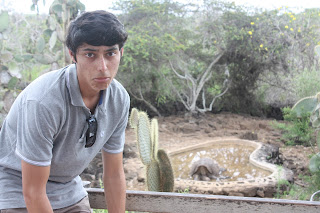I am very fortunate to have a host family here in Ecuador that looks out for me and includes me in their family plans. The only problem is that they have a bad habit of not telling me what their plans are until we are just about to do them. For instance, when my dad was leaving Ecuador, my host family graciously offered to give him a ride to the airport in Quito. I went along, but after we dropped him off we drove around Quito for a while until we arrived at the gate of a recreation center for soldiers and their families (my host brother is a UN Peacekeeper). This is the conversation I had with my host mother in the car outside.
- Where are we going?
- This is a recreation center for the military. Did you bring a bathing suit?
- (*sarcastically pat pockets mock-searching for the bathing suit I obviously didn't bring because I thought we were just driving my dad to the airport and I didn't bring anything, then put on a face acting like I am surprised that I didn't find it*) No.
- That's fine, you can buy a bathing suit inside.
I quickly checked my tone because I figured that even though they didn't tell me to bring trunks, I could still buy a pair inside the place and go swimming anyway. Problem solved. Once inside, I walked up to the counter with my host mother and she asked the lady for a bathing suit for me. What the woman placed on the counter was a thin, 3'' by 3'' plastic package that even before it was opened loudly proclaimed "You will not wear me."
The woman working at the counter took the piece of fabric out of the package and unfolded it. The bathing suit she presented to me was so revealing that I wouldn't even feel comfortable wearing it as underwear, let alone in a pool full of witnesses. Needless to say I didn't go swimming that day. Instead, I took a three hour nap in the lobby until my host family decided to leave.
Staying faithful to their "don't tell Krishna, it'll be funny" policy, my host family didn't tell me anything about what their plans were for Christmas. My family explained to me that in Ecuador, people traditionally eat a turkey dinner for Christmas. I saw the turkey in my kitchen throughout the day on Christmas Eve and got really excited about eating a big dinner that night. At around 6:00 p.m., everyone sat down at the dinner table and we had tamales for what I assumed was an appetizer. I only ate one small tamale and my host mother asked me if I wanted another. "No thanks," I replied coolly "I'm saving space for the turkey."
Everyone ate their tamales, but then dispersed after they were done. I was confused about why we weren't being served turkey so I asked my host father if Christmas dinner happens on Christmas Eve or Christmas day. He assured me that we would be eating turkey that night for dinner, so I resigned to waiting patiently in my room until I was called out for dinner.
I fell asleep in my room waiting, and was woken up at 12:00 a.m. to come eat. What my family had failed to tell me in this instance was that the Christmas meal is traditionally eaten at midnight on Christmas Eve. I evened things out when I ate about a dozen of the leftover tamales over the next two days.
Christmas on the Farm
The next day I was Skyping with a friend of mine in the living room when my host brother poked his head in the room and declared simply "C'mon Kris, we're going", foolishly assuming that I was told anything about what we were doing that day. It turned out that the family was going to spend Christmas on their farm, so I jumped in the car with nothing but the clothes I was wearing and headed out with them.
We got to the farm at about 2:30 p.m. and had a BBQ for dinner. I was ready to go after eating and being on the farm for a few hours, but my host brother started going around collecting money from everyone to buy beer. He was collecting $5 from everyone, which made me nervous because in Ecuador $5 buys a good amount of booze and he was collecting from a lot of people.
He came back with two crates of beer and the family started drinking and playing cards, quite competitively if I might add. It started getting late and it became clear to me at about 10:00 p.m. that no one had any intention of going back to Ambato that night. I begrudgingly accepted my fate and started trying to figure out where I would sleep since there were so many people there, when at the eleventh hour one of my host brothers stopped by the farm and offered to give me a ride home.
From now on, whenever my host family offers to take me anywhere I am packing a pair of trunks, a toothbrush, and an air mattress.
Kids Just Don't Understand
Since Christmas eve, my extended host family has been staying at my house. That means that there are six children running around all the time, and they are unbearably annoying. They consistently cry any time anything happens to them, no matter how trivial. It's like they are in a constant state of crying and they occasionally take a break when they get tired. I swear that the biggest crybaby of them all cried at least 10 times on Christmas Eve. This is a bad enough offense by itself, but what really gets me is that the kids have no dedication to their sobfests.
When these kids cry, they turn on the waterworks and scream at the top of their lungs, but when they either get attention or realize that they are not going to get it they stop on a dime. They then continue doing whatever it is they were doing before they started crying as if nothing happened.
When I was a kid, I cried my fair share but I had much more respect for the art of hissyfit. First of all, when I cried it was almost always for a big deal. I remember one time I had to go with my mother to drop off the babysitter, and she assured me that I would be back home in time to see Power Rangers. When we got home and I realized that I had missed it, I lost it (because she promised!) and demanded that my mother turn back time so I could watch it. Missing Power Rangers might not sound like a big deal to you now, but trust me that in context of the incident it was devastating.
Second, I committed to a temper-tantrum and continued to appear miserable and upset for hours afterward, whether I got attention or not. Locking yourself in your room, sulking in the corner, and packing a bag to run away from home are the kinds of things that contribute to the proper delivery of an episode and must be performed if anyone is to take your whining seriously. It kills me when these Ecuadorian kids are crying hysterically and thirty seconds later you would have never guessed they were unhappy earlier that minute.
Lastly, Ecuadorian kids don't have even an ounce of shame for their ridiculous behavior. One of the kids started crying uncontrollably when someone put ketchup on his rice (which, unfortunately, is a normal practice in Ecuador). They quickly gave him a new bowl of rice and he stopped crying, but it was clear that he didn't feel silly about crying over ketchuped rice after the issue was resolved. When I was a kid I cried over plenty of silly things, but afterward I always realized how silly it was and felt ashamed about it.
Bottom line: I still hate kids.
Crabs
Tonight my family ate crabs for dinner. I'm going to go ahead and say that eating crabs is stupid. They freak me out because they look the same dead as they do alive and they have all kinds of hairs and hard to identify meat parts. They are also a lot of work to eat and they don't really taste like anything. Crab eating is even worse in Ecuador because they apparently haven't adopted the use of shell-breaking tools yet, and everyone at the table was using their teeth to crack the crabs open. My molars were hurting just listening to it; I'm going to have to brush my teeth with Sensodyne twice tonight.
 |
| Host parents, brothers, a couple of wives, and one baby. |























